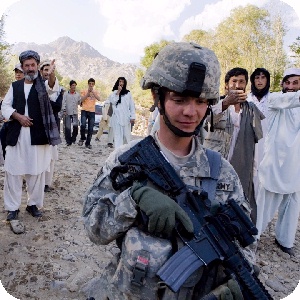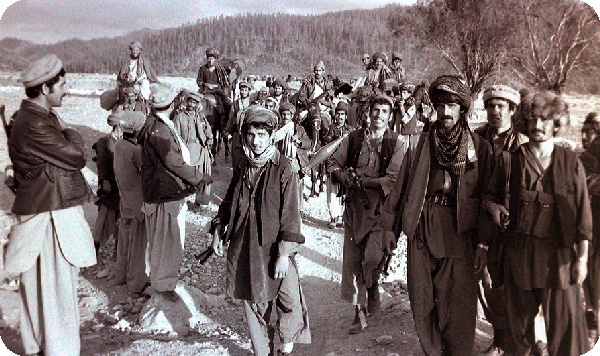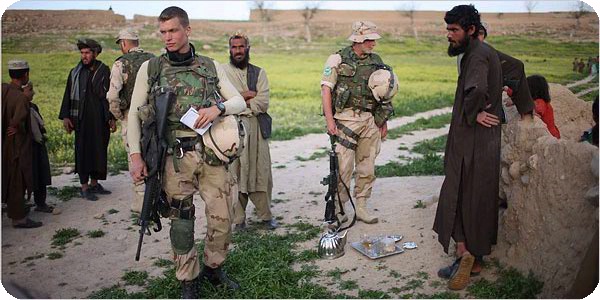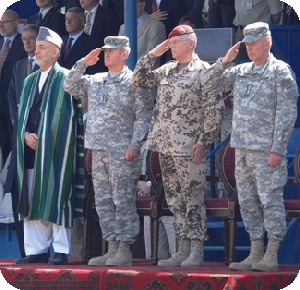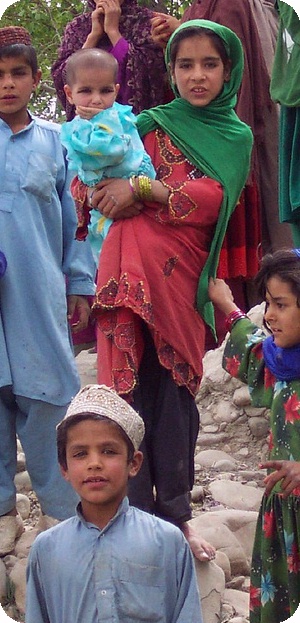|
|
|||||||||||||||||||||||||||||||
|
The Future of Afghanistan
CAN AFGHANISTAN BE SAVED?
By Jim Ramphal - September 2009. Afghanistan: One of the most conflict ridden nations on Earth is once again at a crossroad of history. For nearly 8 years an allied NATO force of tens of thousands of troops has been battling a resurgent Taliban and what is widely reported to be elements of Al Qaeda, fostered by support from Afghan nationals and Pakistani sympathizers, who all claim allegiance to Islamic fundamentalism and a shared hatred for what they see as immoral Western designs in the region. President Hamid Karzai’s government has long been criticized for the levels of corruption which are hampering his efforts to secure the country from the ‘insurgency’ which has threatened to return the Taliban to power, while this year saw the heaviest losses to date of NATO forces throughout the country in some of the fiercest fighting since the US and its allies launched the invasion on March 15th 2001. The invasion of Afghanistan was prompted by U.S. claims that the attacks of September 11th 2001 were born and bred in the al Qaeda training camps operated there with the blessing of the Taliban, but this is only the most recent attempt to subdue a nation long seen as pivotal for control of central Asia. Such ambitions began with Alexander the Great’s conquest of Bactria in the winter of 334 BC. Although he eventually subdued the tribal warlords, renowned for their ferocity and fighting skill, the conquest was a long and arduous war of attrition, far more costly than Alexander and his Generals had envisioned. The next major power to invade Afghanistan was Great Britain in May of 1879. This was to challenge what was seen as Russian interference in Kabul, in direct defiance of the Conference of Berlin, which had forced a reluctant peace treaty between Russia and the Ottoman empire. In just under 2 years, the British were compelled to withdraw their forces after sustained guerrilla attacks from tribal warlords that demoralized their troops, confounded their command structure, and drained public support for the Afghan campaign in the U.K.. One hundred years later, the former Soviet Union was the next foreign power to try its hand at occupation. On December 24, 1979 over one hundred thousand Soviet troops marched into Afghanistan. They quickly subdued Kabul, installing their own pro-Soviet ruler, Babrak Karmal, and settled in for what they thought would be a relatively short, conflict free occupation which would simultaneously consolidate their power in the region, thwart Iran's influence and shore up the faltering Communist government that had clung to power there since the 1970’s. There was also the greatly sought after prize of control over the vast central Asian oil and natural gas deposits, and the construction of a network of pipelines with which to transport those riches to and from the then Soviet satellites of Kazakhstan, Kyrgystan, Tajiksistan, Turkmenistan and Uzbekistan. Instead, the huge Soviet invasion force was met by fierce opposition that gathered momentum from the very beginning of the conflict; an alliance of Islamic guerrillas, supported primarily by the United States and other Western nations, that drew upon the proud history of Afghan resistance to foreign invaders, fueled by a growing mistrust and hatred for the then Communist government and Soviet influence in Afghanistan, which had been implanted since the 1950’s.
The Mujahidin or ‘Holy Warriors’ as they became known, began a decade long war of attrition with one of the most technologically advanced and well trained armies on Earth. Utilizing a strategy of hit and run attacks, facilitated by massive infusions of weaponry and tactical support from the U.S., they were able to sustain increasingly heavy casualties and massive losses of equipment on the Soviets, wearing down their ability to maintain their military presence during a grueling 10 year period, that saw the former Communist empire pour ever larger amounts of money, material and manpower into what became an impossible mission. They were forced to retreat in 1989, and the aftermath of the war effectively destroyed the Soviet Union. Afghanistan was then a country virtually in name only. With no viable government, its infrastructure in ruins and only a cursory and waning interest by the West, it was essentially left to its own devices. The fate of the nation was now firmly in the hands of the Mujahidin. Despite its previous reliance on Western infusions of money and weaponry, the Mujahidin rapidly began to distance itself from that alliance, and became increasingly dominated by a strict adoption of Islamic values and traditions as outlined by their interpretation of the Koran. The rejection of all things foreign, with the emphasis on Sharia Law, an abiding submission to Islamic Fundamentalism, was certainly not unexpected for a nation that had historically seen countless foreign invaders thwarted by a religiously motivated resistance. In this context, it is not difficult to understand how the Western allied Mujahidin became the anti-Western, theologically hard line Taliban. After the withdrawal of Soviet forces in 1989, Afghanistan was a nation in disarray. The Tribal warlords which had been aligned against the Soviets, now began to battle for control of their ancestral territories. Scores of conflicts broke out as individual groups sought to destroy one another in what became a bitter and bloody civil war. Years of strife produced little more than chaos. By 1994, a new religiously motivated group began to emerge from Kandahar. It was formed by former Mujahidin and Fundamentalist adherents to Wahhabism, a strict interpretation of the Koran which began in Saudi Arabia, practiced by those Mujahidin refugees who had attended madrassas or places of learning, in neighboring Pakistan. They became known as the Taliban, under the leadership of Mullah Mohammed Omar, a fierce advocate of strict Islamic rule, who said ‘"I am ready to sacrifice everything in completing the unfinished agenda of our noble jihad, until there is no bloodshed in Afghanistan and Islam becomes a way of life for our people.’ Post war conditions could not have made their rise to power any easier; the vast majority of the population were uneducated and illiterate and considered the Mujahidin to be their saviors, what little infrastructure Afghanistan had before the war was now destroyed, and support in the West for a sustained presence in the war torn nation was rapidly waning. By 1996 the Taliban had secured Kabul and become the de facto government, with Mullah Omar as its unchallenged leader. The resistance movement of the Mujahidin had now seamlessly morphed into the Taliban, which employed a strict adherence to Fundamentalist Islam, fueled by their growing sense of unbridled nationalism. Initially the Taliban seemed poised to make great progress in Afghanistan. Almost immediately they set about to destroy the burgeoning poppy fields which had long supplied the West with the illicit heroin trade, and was a consistently lucrative crop for the majority of Afghan farmers. The Taliban successfully convinced the population that poppies were emblematic of their sublimation to the West, and that their cultivation was an offense to their Islamic faith. It was this adherence to their strict interpretation of the Koran which began to show troubling signs that the Taliban had their own set of theocratic based values which may not have been in line with those of the average Afghan, and certainly held no affinity for those of the ‘decadent’ Western world at large, primarily the United States. Under the Taliban, girls were not allowed to attend school, as this was seen to be in conflict with their reading of the Koran. Women were not permitted to work outside the home, and could not move about in public without the traditional Burqa which covered them from head to foot, nor without being accompanied by a married male relative. They banned music, television and movies as these were elements of corrupt Western influence. Men were not allowed to shave or trim their beards. These and many other restrictions were harshly enforced, with many transgressions of the smallest nature met with severe punishment, including death for those deemed to be a flagrant affront to Islam. Little of this seemed to draw the attention of the West however, as the Soviet withdrawal from Afghanistan largely being the last item of interest to most Western nations, few of which knew or cared about Islamic Fundamentalism, or felt any of the effects of the changing nature of Central Asian politics. That of course was before the events of September 11th 2001. The coordinated attacks on the United States that day focused attention on Afghanistan to an extent not seen since the Soviet invasion 11 years earlier, and brought Islamic Fundamentalism to the forefront of Western attention. There had been many signs of the rising power of this movement before 9/11, with numerous and devastating bombings occurring throughout the globe, but nothing so dramatic and stupefying as the destruction of the World Trade Center on live television had ever been witnessed by a stunned worldwide audience. A previously unknown group called Al Qaeda, led by Osama bin Laden, a Saudi billionaire of Yemeni ancestry, was blamed for the attacks, in retaliation for what they saw as foreign intervention in the Middle East, and the Israeli occupation of Palestinians, supported by the United States and other Western powers. (Editor's Note: Al Qaeda or "The Base" is not the official name of the group. Its the name the CIA started calling the group just prior to September 11th. Osama bin Laden only started referring to his group as such after September 11th.)
Then U.S. President George W. Bush determined he had the moral imperative to launch what he termed ‘The Global War on Terror.’ The Taliban were widely suspected of harboring bin Laden, and became the focus of sustained international pressure led by the United States, to extradite him for trial, which they consistently refused to do, denying any support for him or Al Qaeda. Universal condemnation of the events of 9/11 and support for an immediate military response led the president to form a ‘Coalition of the Willing, ‘ and prepare for an invasion of Afghanistan, whose Taliban sponsored training camps U.S. intelligence services were quick to identify as the operational and strategic source for the attacks. In his speech to a special joint session of the U.S. Congress on September 20th 2001, President Bush summarized his position by stating ‘The course of this conflict is not known, yet its outcome is certain. Freedom and fear, justice and cruelty, have always been at war, and we know that God is not neutral between them.’ On October 7th 2001 a massive multi-national force headed by the United States, invaded Afghanistan. Though the Taliban resisted fiercely, they were no match for the sustained bombing campaign and military might of the Coalition, and by the end of the year they had been ousted from power. The intervening 8 years have seen changes to Afghanistan, little of which has amounted to much benefit for the Afghan people.
With the removal of the Taliban, the United States and its NATO allies began the task of rebuilding Afghanistan by attempting to forge a democratic state from the ashes of 10 years of Fundamentalist Islamic rule. Yet almost immediately after combat operations had ceased, President Bush began to draw military focus away from Afghanistan and towards Iraq, leaving his NATO allies with virtually the sole responsibility for the future of the war torn country. Many of these allied nations did not enjoy the widespread support for the Afghan mission among their domestic populations as the American president had relied upon from his citizenry, leaving many of them in a desperate situation to defend their continued presence to their electorates, particularly with the decreasing attention militarily and strategically of the one nation that had claimed to be morally and legally justified to be there by virtue of its being attacked. With American interest in Afghanistan subsiding, and their subsequent involvement in Iraq growing, the Taliban made the most of the opportunity to reconstitute their power Most of the senior leadership had sought refuge in the mountainous region between Pakistan and Afghanistan. Pakistan has long-standing ties with the Taliban, having been one of only a small handful of nations to have recognized its legitimacy and to have maintained diplomatic relations, and shares with them widespread support for the idea of an Islamic theocracy throughout the region During the 2004 Afghan presidential elections, the nations’ first ever national opportunity to vote for its own leadership, the Taliban re-emerged as a viable and destructive force, utilizing a series of suicide bombings and scores of guerrilla attacks that threatened to derail the process through fear and intimidation. It didn’t succeed however, as millions of Afghans braved the terror and elected Hamid Karzai, an ethnic Pashtun from a distinguished family, educated in the West who had served as a mediator and advisor to the Mujahidin, as the first democratic president of Afghanistan. He was immediately denounced by Taliban spokesmen as being a pawn of the United States, and became the focus of several unsuccessful assassination attempts, though many in his cabinet did not fare as well. Karzai has been deluged with a host of problems; the removal of the Taliban gave Afghan farmers the leeway to again begin the lucrative production of poppies, with much of the proceeds widely thought to be used to purchase armaments for the Taliban, support for the Afghan mission has continued to fade among NATO allies, with many nations issuing firm dates for the withdrawal of their forces, charges of widespread corruption have emerged almost from the beginning of Karzai’s first term in office, much of the country remains in ruins after 30 years of violent conflict, and illiteracy and impoverishment continue to plague the country.
The results of the second Afghan national election on August 20th 2009 remain to be seen, with widespread charges of fraud and election tampering levied by Karzai’s main opposition leaders, his re-election is anything but certain. The administration of U.S. President Barack Obama has pledged a renewed commitment to Afghan sovereignty, and has bolstered U.S. troop numbers to their highest levels since the invasion began 8 years ago. President Obama and his new military commander in the region, General Stanley McCrystal, have made it clear that they intend to focus less on military operations and more on domestic issues that will improve the day to day lives of Afghanis. The immediate effectiveness of this strategic shift seems mixed at best; the election was carried out with a relative minimum of violence, but the voter turnout was considerably lower than in 2004, which then saw roughly 70% of eligible voters at the polls in spite of the horrific violence, with approximately 40-50%.of voters casting ballots last week. There have been numerous reports by independent election monitors of serious election fraud, with literally thousands of complaints issued ranging from voter intimidation to ballot stuffing and falsified vote counts, all of which bodes very poorly for the Karzai government, already mired in controversy over the levels of corruption and foreign influence leveled by a frustrated, war weary population. Add to that the recent drone attack on two oil tankers, which is suspected of killing up to 70 innocent civilians, and the strategic shift so lauded by President Obama appears to have become just another fractured episode in the long nightmare that is Afghanistan today. For a nation which has survived so much for so long, the future of Afghanistan remains highly uncertain. The contradictions are best summed up by Malalai Joya, the youngest woman elected to the Afghan Parliament, unthinkable under the Taliban, who said of the recent elections, ‘Democracy will never come to Afghanistan through the barrel of a gun, or from the cluster bombs dropped by foreign forces. The struggle will be long and difficult, but the values of real democracy, human rights and women's rights will only be won by the Afghan people themselves.’ As they say in the Islamic world, Insha'Allah.
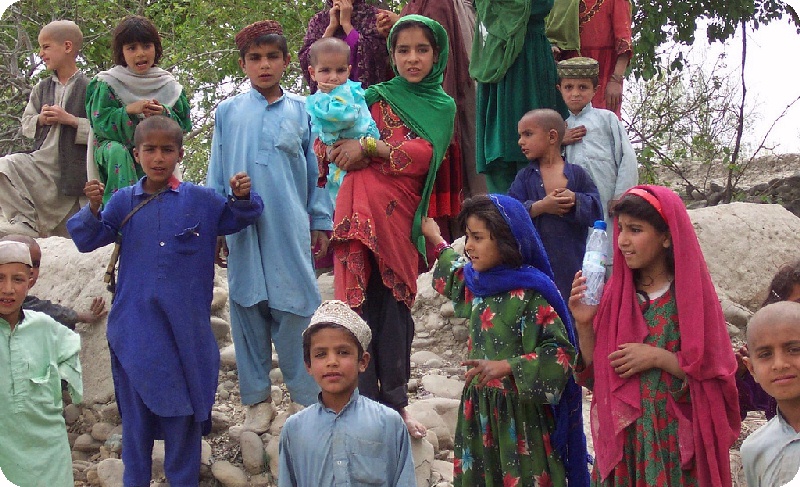
|
|
||||||||||||||||||||||||||||||
|
Website Design + SEO by designSEO.ca ~ Owned + Edited by Suzanne MacNevin | |||||||||||||||||||||||||||||||
